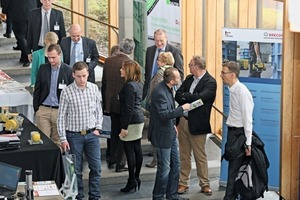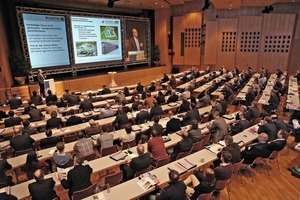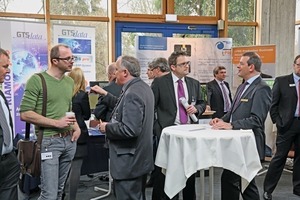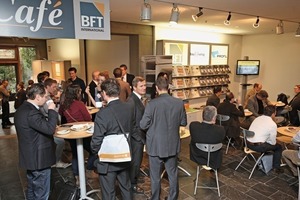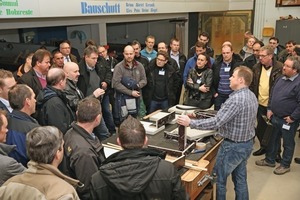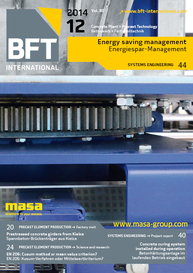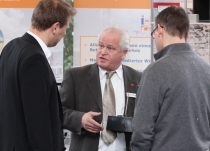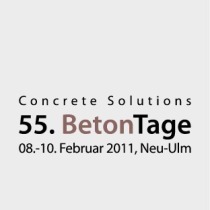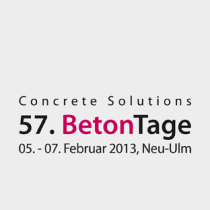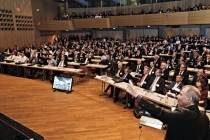59th BetonTage congress focuses on concretes of the future
“Concretes of the future” is the heading under which the precast industry will meet once again at the BetonTage congress to be held in Neu-Ulm, Germany, from 24 to 26 February 2015. Attendees will enjoy a three-day technical program, about 90 high-profile speakers, 13 panels and 160 exhibitors from the supplier, engineering and software industries. As usual, the technical program will cover all relevant segments of the precast industry.
Structural precast
Two panels will again be dedicated to structural precast. Structural Precast 1 will present selected practical examples to showcase the wide range of possible applications of precast elements. It will highlight design and engineering challenges, present crucial points to be considered in relation to dimensional tolerances, and illustrate the degree of freedom that certification systems for sustainable construction can provide for the design of precast elements.
Structural Precast 2 will deal with innovative technical solutions, including research findings with respect to constructing a concrete basement that can be thermally activated. Furthermore, the panel will inform attendees of the current state of research regarding the fire behavior of prestressed precast floor slabs, the load-bearing characteristics of spun concrete columns with high-strength steel reinforcement and ultra-high-performance concrete, and the use of façade panels consisting of textile-reinforced high-performance concrete. In addition, the requirements for fatigue verification of composite elements will be discussed.
Lightweight concrete
The Lightweight Concrete panel will highlight the implications of the new DIN EN 1520 standard governing precast reinforced elements made from no-fines lightweight concrete. This panel will also present a newly developed, triple-layer lightweight wall element with a high degree of thermal insulation and a mechanically founded design model to verify the shear resistance of composite floor slabs. The program will be rounded off by papers on a new earthquake zone map and on the design and application of fastening systems for structural lightweight-concrete components.
Road construction, gardening and landscaping
Once again, the event will feature a panel dedicated to manufacturers of products for Road Construction, Gardening and Landscaping applications. Its agenda includes reports on the findings of a current study of the environmental impact of various top course designs in traffic areas and presentations on the use of low-noise concrete pavers and on the production of high-strength concrete pavers. Furthermore, the panel will highlight the challenges in manufacturing black concrete products by adding iron oxide or carbon pigments, as well as legal aspects, for instance with regard to the manufacturer’s duty to inform and in respect of contracts for work and supply agreements for contractors in the gardening and landscaping sector.
Cast stone
The Cast Stone panel will focus on selected project reports. In addition, it will demonstrate how the performance of concrete can be improved or enhanced by adding innovative binders or applying new surface finishing technologies. Custom mold and formwork solutions add new design options.
Pipeline construction and wastewater systems
The Pipeline Construction and Wastewater Systems panel addresses both manufacturers and representatives of the public sector. It will include presentations on quality control and error prevention in the design of sewage systems, as well as on the new DWA-A 161 and DWA-A-127 worksheets. Speakers will also report on the experience gained with lined precast elements to accelerate wastewater flow, the use of steel-fiber-reinforced concrete for tunnel lining segments and of self-cleaning slot drains.
Small wastewater treatment plants
The panel on Small Wastewater Treatment Plants specifically addresses representatives of municipalities, particularly specialists from local water authorities, and officially appointed private water management experts. It will include papers on current standardization activities, the application of Technical Specification 16.637, and reports on the use and maintenance of small wastewater treatment plants.
Current research findings
From Research to Practice will focus on innovations in the field of concrete technology, such as state-of-the-art concretes containing low-clinker cements, carbon-reinforced shotcrete, new, multifunctional impregnations, and optimized self-compacting concrete mix designs. Furthermore, it will highlight new fields of application in the renewable energy sector, as well as concepts to incorporate resistance classes in the future concrete standard.
The panel on Application-Oriented Research for Concrete will present a quick test method to determine carbonation resistance, as well as concepts to develop and evaluate concretes with reduced carbon emissions and to verify the durability of structural components made from innovative concretes. It will also demonstrate how to mitigate the adverse effects of clay minerals on PCE-based plasticizers and to improve the characteristics of high-performance concretes by optimizing the mixing process. Presentations on new findings and calculation methods to determine creep and shrinkage of ultra-high-performance concrete will round off this panel.
Which points need to be considered when producing high-performance concrete; which new fields of application arise for structural components made from innovative concretes; which joint geometry is optimally suited to this purpose? These and other questions will be dealt with at the Potentials of Precast Components of the Future panel. This panel will also demonstrate how a new method ensures greater cost efficiency in the construction of free-form concrete shells and how innovative spacers facilitate the manufacture of textile-reinforced concrete in the casting process. In addition, a reinforced-concrete design app suitable for smartphones and tablets will be presented.
Concrete in structural engineering
Among other topics, the Concrete in Structural Engineering panel will deal with waterproof concrete basement structures. It will discuss a case of damage and present a planning tool to determine risk indicators for potential cracking. Practical guidance will be given for designing parking decks and impermeable load-bearing and non-load-bearing foundation slabs of underground parking garages. This panel will also deal with the new DIN 4109 standard on the sound insulation in buildings.
Business and law
The Business and Law panel will deal with legal and economic aspects of the day-to-day operational business in the industry, including contracts for work, provisions in subcontractor agreements, and the legal requirements related to the design and execution of projects. It will also discuss the benefits of energy management systems in the concrete industry, as well as various aspects of competition law.
Please visit //www.betontage.com" target="_blank" >www.betontage.com:www.betontage.com to view the complete program.

